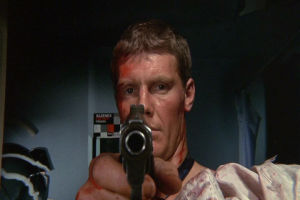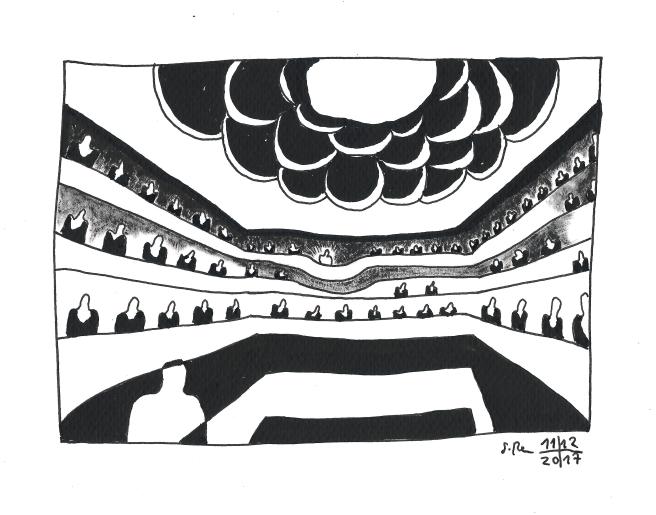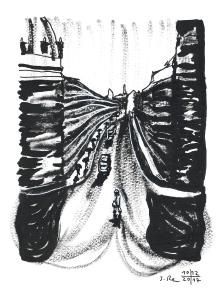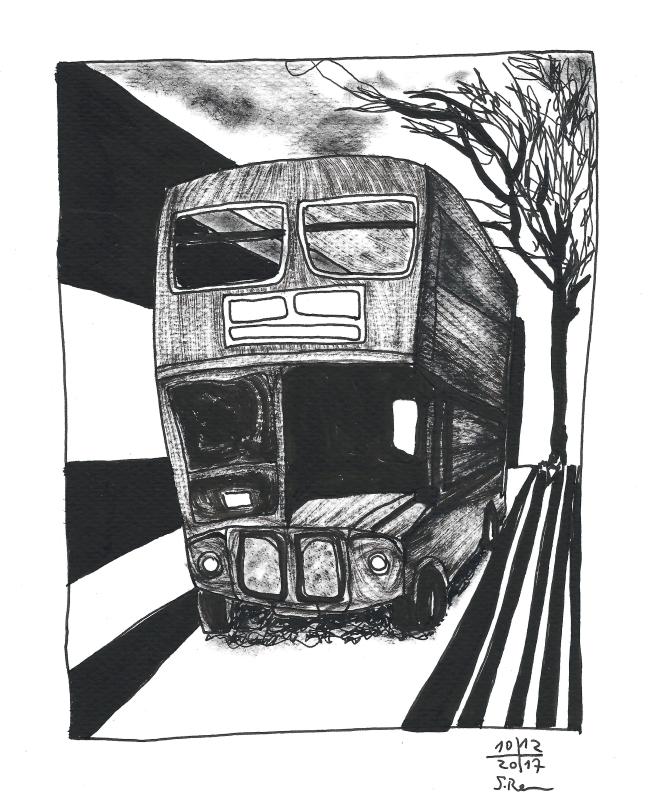
This is the third short story of mine that my good friend Susanne from Blackpenart has illustrated in her expressionistic Noir Gothic style and the result is, I think you have to agree, simply excellent. You can view the previous two stories The Illustrated Unmade Again & An Illustrated Promise of Paradise by clicking on the links.
If you have enjoyed this story then make sure to take a look at my new collection of 69 inter-related poems and short fictions, Motion No.69, by Alex Severs and fulsomely illustrated by Thea Kiros.
Proof

All weekend long I had failed to act upon the ultimatum handed down by Sarah on the Friday night I left her to return home to my wife. Breakfast on Monday morning was my last opportunity. But I realized —as I sat down to cereals, toast and tea— that putting an end to a twenty-three-year marriage at 7:50 am on the drabbest of all days, seemed wildly inappropriate. I couldn’t cope with the inevitable ugly scene of harsh words, bitter tears, righteous indignation and promises of reprisals before leaving for the city and work. The trouble was I could now expect a row with Sarah. Hopefully, she would have the discretion to wait until after office hours, though I wasn’t optimistic. Her tact had been embarrassingly absent lately.
I kissed Catherine goodbye as I had everyday throughout the many years of our marriage, wished her a good day at work, for which she would soon be leaving, and drove away without a backward glance at her figure retreating into our house. Soon, the traffic slowed to its customary crawl, then to an absolute standstill. For once, I was relieved by the delay. Perhaps I could ponder a way out of my present predicament. Nevertheless, I needed more time than a temporary traffic jam afforded to come up with a solution; eternal gridlock might be required. The real problem was that I had no clue as to what I really wanted.
On one hand, I couldn’t quite shake the conviction that Sarah was just a means of establishing that I existed independently of Catherine; that I, in fact, actually existed at all. And yet, sometimes I felt that Catherine was the mistress of my destiny, controlling even the minutest of details, down to my last breath. My own thoughts and actions seemed so nugatory that I sometimes I wondered whether I was just a figment of her imagination. I can barely remember my life before Catherine. I don’t think I had a childhood, so dim is my recollection of that period. I must have, but it had to have been free of both trauma and definition.
My first memory dates from age thirteen and a moment of existential realization. I had been dozing in the bath, when I came out of my semi-slumber with a start and caught my reflection in the mirror that bordered the tub. I didn’t recognize myself. A series of questions raced through my mind in rapid succession. Who is that in the mirror staring back at me? Is it me? If it is, who am I and what am I doing here? These remained unanswered and left me wondering whether I possessed any claims to objective reality whatsoever.

At first, it was only my existence that I doubted. But in time, it seemed to me that the world’s claim to authenticity was increasingly based on dubious suppositions.
My early adulthood consisted of a series of restless moves from city to city —a vain attempt at finding a place where I belonged. Of course, the difficulty did not lie with the locales; it lay within me because no matter where I was, I never wanted to be there. There was always a hell of a place next door, so I’d go there instead. I expected cities to possess a massive actuality —all that tangible brick and steel, glass and concrete— but they were only hastily-constructed, poorly-planned stage sets. And on these stages, I became the tenacious, wavering, insubstantial consort of wan, wannabe chorus girls,
anemic corps dancers, and anorexic bit actresses. I required something or somebody to lend me a presence, to give me density, to solidify my essence, to provide an anchor to stop me from floating away into the stratosphere and dissipating altogether. That’s when I met and married Catherine.
Lost in memories, I didn’t notice that the traffic had moved forward a full three feet until the angry blare of car-horns shook me from my reverie. I inched forward before coming to a complete stop again.
Catherine was unlike all the girls I had dated previously, fleshly and fulsome, where the others had been stick-thin androgynies. Her blonde hair, blue eyes and heavyset bone structure more than hinted that her remote ancestors had originated in the frozen North. I had found her, and still find her madly irresistible. Catherine will always be the perfect woman for me; she is as attractive in her forties as many girls in their twenties, including Sarah. As soon as we had set up home together she set about taking me in hand.
Naturally self-assured, she had confidence to spare and by proxy, I became a man of the world. Not that I didn’t have setbacks and mood swings, but whenever I was paralyzed by a sense of unreality, Catherine would provide rock steady support and nurse me back to life. Not to mention that there was always comforting to be found between her heavy bosoms.
Catherine has a telepathic awareness of everything I experience. She knows when the pressures at the office are becoming too much for me to bear and she gently chides me whenever I develop a minor crush on one of the office girls. At least she did until recently.
Above and beyond all that, however, she was the mother of my twin daughters, who provided at last some sense of purpose to my existence. I was a husband and a father to two lovely girls. I had responsibilities and duties. To my credit, I have discharged my duties admirably with care, attention, due diligence and most importantly, a genuine love. But there comes a time when, although your children are always your children in your heart, that they must grow up and enter the world and become their own people.
The knot of traffic had unravelled itself and soon after, I entered the company’s car park. I was looking forward to this Monday even less than usual.
Late as I was, Sarah’s office was empty when I passed it on the way to my own. It was unlike her to be late. I was in equal measures relieved and disappointed. On one hand, I had temporarily avoided the inevitable questions concerning the current state of my marriage and the repercussions that held to my relationship with Sarah. But on the other, I almost anticipated her reproach for my inaction. All weekend, I had imagined Sarah anxiously counting down the hours until Monday morning, when her loneliness and grief would be assuaged at the sight of me.

Last year, her affectionate but wayward father died —her sole remaining relative since her mother had committed suicide when she was five. Her childhood had been singularly unsettled. By the age of fifteen, she had extended stays in every major Anglophone country on four continents. She and her father had doted on one other and his death had left a void in Sarah’s life which I was particularly suited to fill. Her father was my contemporary and judging from the photo she kept on her bedside table, I noted a vague resemblance —we both had the dark hair, pale skin and green-grey eyes of the Celts. Moreover, I felt an affinity to the person Sarah described endlessly after our lovemaking; a potent combination of wanderlust, melancholy, wasted intelligence, unworldly innocence and a knowing complicity in his own failure.
Sometimes I doubted that I could ever displace the memory of her father. I began to resent hearing every last detail of her childhood, in which her father —as a single parent— played a larger than usual role, during the hurriedly snatched hours we spent together. I eventually concluded that Sarah had accepted me not because I was similar to her father, but because I was his complete opposite; stable, staid and boringly predictable. Certainly, my mid-life crisis, and my attempts to inject some validity into my existence though the agency of a chit of a girl in need of a father figure were conventionally clichéd.
When Sarah still hadn’t shown up by 11:00, I finally cracked and phoned first her home and then her mobile. No answer and the calls didn’t go to voice mail either. Where was she?
As I sat pondering this question and what I would do if Sarah came marching up to my office now, demanding to know why I had not told Catherine about our affair, the telephone rang. Thinking it was Sarah, I answered. It was Catherine, calling me on her break, a working day ritual.
While we were talking, I was struck by the fact that Catherine, who usually possessed an uncanny ability to gauge my psychological depths, had noticed nothing unusual since I had first become involved with Sarah —my first real infidelity of our marriage. Or if she was aware, then she wasn’t letting on. In either case, it seemed out of character. I was an open book to Catherine and this wasn’t something to which she would turn a blind eye. Maybe she was unconsciously aware but was in deep denial, or maybe she thought it impossible that a twenty-two-year-old girl would fall for a middle-aged nobody like me. However, both scenarios seemed highly unlikely. Catherine was far too shrewd to overlook the evidence before her and she had always questioned the real motivation behind my constant self-deprecation.
The conversation proceeded as usual with the obligatory I-love-you’s signing off. Nothing was amiss in Catherine’s attitude and, yet I felt that something was being left unsaid on her side as well as mine. I knew that this creeping paranoia was a manifestation of my guilt, but knowing the cause doesn’t necessarily rid you of the effects.
The rest of the day was a limping agony, every moment dragging uselessly and painfully. My indecision was total. Whereas I had previously dreaded an encounter with Sarah, when it was deferred though her absence, I positively longed for her presence violently and absolutely. How would it be possible for me to live the remainder of my life without her? Could I deny my feelings concerning Sarah if questioned directly by Catherine? Could I carry on living the lie with Catherine, pretending that there hadn’t been some form of sea change in our marriage?
Yet how could I abandon my wife of twenty-three years, the only person whose company wasn’t occasioned by barely-suppressed feelings of loathing and nausea? Catherine was the only person who’d been able to fill in the blank spaces. So, what was I doing with Sarah when I had already been completed by another?
The telephone was glued to my ear as I repeatedly tried Sarah. Ringing out no answer. Ringing out no answer. Whenever someone passed the office I would mouth some form of inanity to pretend that I was busy bantering to a client and consequently raking in the cash for the firm. Where was she, why wasn’t she at work? It wasn’t like her to miss a day. In fact, Sarah never missed a day because I never missed a day. Sarah had nobody but me.
By three o’clock, the suspense was unbearable. I couldn’t wait any longer, I simply had to know where she was. Thinking perhaps her desk would yield a clue, I hurried to her still darkened office. I let myself in and closed the door behind me. Dread settled on me like a shroud. Not only was the office unoccupied, but it also appeared unused. Had Sarah left the company and not told me?
I had to leave the office. As I rushed back to my own desk, I passed one of my co-workers. “Have you seen Sarah?” I asked, trying not to sound panicked.
“Sarah? Sarah who?” he replied absently.
I didn’t answer. I returned to my desk to grab keys and coat and let my boss know that I was ill. As I sped towards Sarah’s flat on the other side of the river, I imagined the worst of the worst-case scenarios. I had visions of bathtubs filled with bloody water, clotted syringes, discharged guns, empty pill bottles, fishnet nooses… that body that I had touched and kissed, caressed and stroked, worshipped and revered mimicking a thousand different postures of death.
Parking was always a problem in Sarah’s neighbourhood, but I found a place with ease, probably because of the early hour. Sarah didn’t own a car —instead she relied on public transport and myself to get around— so I was still none the wiser to her whereabouts. I buzzed the front door several times but without result. Now, I was beginning to get really anxious. I had a spare set of keys, something Sarah had insisted upon about a month ago, even though up until now I had no occasion to use them as we had always gone back to her flat together. I opened the front door and ran up the seven flights of stairs to her flat on the third floor and entered without bothering to knock.

If I had found Sarah in bed with someone else, or I had discovered her dead body, I would have been less surprised than by what I beheld: nothing. The flat was empty, completely empty, save for the furniture doubtlessly belonging to the landlord. Nobody had left in a hurry either —the flat was clean except for an accumulation of dust. It was obvious that the place hadn’t been occupied for months and, yet I had been here just three days ago. It was devoid of any personal effects or stray items of clothing. Where was everything? Where were the clothes, shoes, lingerie, accessories, TV, computer, mobiles, books, pens, pencils, paper, ornaments, figurines, mirrors, pots, pans, plates, knives, forks, spoons, toothbrushes, combs, hairbrushes, toiletries, soaps, fragrances, kitchen towels, toilet paper, bed clothes, pillows, throws, coins, chequebooks, credit cards, purses, handbags, suitcases? Where had they gone? Where had she gone? And if she wasn’t here, and had never lived here, did Sarah actually exist? Had she ever?
If I searched around in the Human Resources department at work for the relevant and necessary documentation concerning Sarah Graves, would I find anything? If I contacted the various governmental agencies, would I be able to obtain a copy of a valid Birth Certificate or Driving License or National Insurance Card or Death Certificate to prove beyond a shadow of a doubt that Sarah had once resided in the unoccupied flat where I was vainly searching for clues? That she had been born twenty-two years ago? That she possessed a definite, legal, irrefutable claim to reality? Even if I did stumble upon such proof, would it be enough to make me disbelieve the evidence of my own eyes? And was the evidence of my eyes enough to discredit my vividly tangible memories of Sarah?
I dug the nails of my right hand into the palm of my left to convince myself that I could at least feel pain. I could, but that did nothing to set realities aright. It merely demonstrated that this hallucination, dream, vision, delusion or whatever it was, possessed an internal, logical consistency. Yet surely that was quite consistent with the nature of delusions, visions, dreams and hallucinations. Certainly, if you are in the grip of madness, then by definition the hold of that madness upon you is gripping.
All this circular thinking didn’t change the central fact, however. Sarah had disappeared so totally that it appeared that there was no such person. Had I imagined her? Was she merely a figment of my overwrought imagination? Was she just a dream dreamt by someone in turn dreamt by another?
I retreated from the empty space, having found no answers, only enigmas.
I expected the streets to have subtly changed, to be transfigured and transformed, as if at last they could reveal their true natures to me. They were just the same old, same old streets however. There had been no rupture or rapture and the oh-so familiar scene contained no revelation for me. The only truth held by the streets with its buildings and in the incurious gazes of its passers-by, was a truth I had known all along —that I would always feel like a stranger here regardless of how closely I mimicked the mannerisms of its inhabitants.
Catherine was already home when I pulled up into our drive. I had decided to fake a migraine to deflect suspicion from my early homecoming and the haunted expression I’d be unable to mask. Catherine was very solicitous and mothered me accordingly, taking me to bed and tucking me in. She kissed me on the forehead and regarded me knowingly before drawing the curtains and turning out the lights. Did she know that I knew that she knew? “Sweet dreams,” she said, closing the door behind her, leaving me alone in the dark.




 Filled with heavy dread she rushed around cramped studio trying to make up for time lost, but of course wasted hours could never be got back and her frantic efforts threw her into more of a panic. Indeed, things went from bad to worse as she bolted towards the front door, taking final swig of coffee to keep her focused and it spilt over best suit she’d picked up from dry cleaners only yesterday, at considerable expense given finances at present time. She had nothing else suitable to wear, the only thing remotely business-like was a white cotton suit set, jacket and blouse, but it was the nearly the end of November. There was nothing for it now apart from making do. She searched around for an umbrella before remembering that she’d left it in a taxi a couple of nights ago, but at least she had a raincoat, Thank God for small blessings.
Filled with heavy dread she rushed around cramped studio trying to make up for time lost, but of course wasted hours could never be got back and her frantic efforts threw her into more of a panic. Indeed, things went from bad to worse as she bolted towards the front door, taking final swig of coffee to keep her focused and it spilt over best suit she’d picked up from dry cleaners only yesterday, at considerable expense given finances at present time. She had nothing else suitable to wear, the only thing remotely business-like was a white cotton suit set, jacket and blouse, but it was the nearly the end of November. There was nothing for it now apart from making do. She searched around for an umbrella before remembering that she’d left it in a taxi a couple of nights ago, but at least she had a raincoat, Thank God for small blessings. at least they’re cheap.
at least they’re cheap. yet, but we‟re nearly there now. One hundred and ten, one hundred and eleven, as last, and the third floor lay before her, vast vistas of aisles and shelving stretching onwards towards a terrible infinity of nothing but books, books, books as far as the eye could see. A labyrinth of books where you would forget everything about yourself and your existence, a maze of books where you would lose yourself in other peoples lives and other people’s words, a prison of books from whence you could never escape from the dream of others and from the tyranny of your own consciousness. She turned and fled down the one hundred and eleven steps.
yet, but we‟re nearly there now. One hundred and ten, one hundred and eleven, as last, and the third floor lay before her, vast vistas of aisles and shelving stretching onwards towards a terrible infinity of nothing but books, books, books as far as the eye could see. A labyrinth of books where you would forget everything about yourself and your existence, a maze of books where you would lose yourself in other peoples lives and other people’s words, a prison of books from whence you could never escape from the dream of others and from the tyranny of your own consciousness. She turned and fled down the one hundred and eleven steps.

